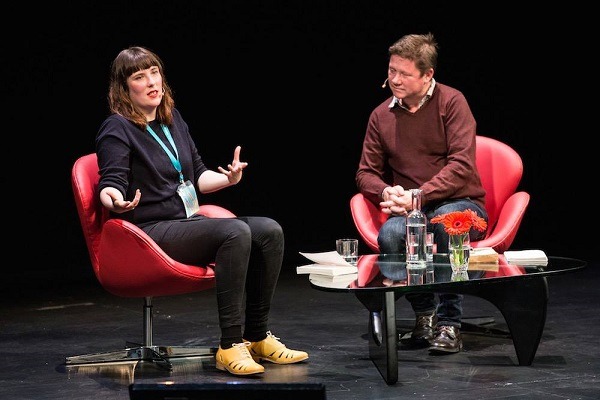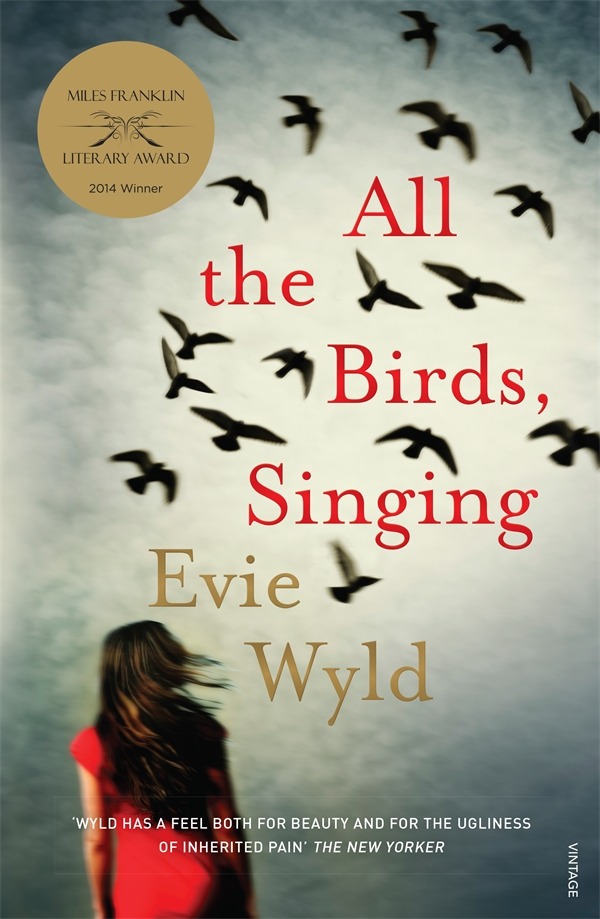The Roslyn Packer Theatre was abuzz with chatter, much about Evie Wyld and her latest novel All the Birds, Singing. There’s often much contention about the ending, and while people tossed up theories and commented on Wyld’s Miles Franklin win, the lights went down and Evie stepped onto the stage.
With her fringe and bright yellow shoes she was already a character in herself. And throughout the hour, Wyld spoke with wit and wisdom (my notes are a slanted scribble that’s hard to decipher; a testament to the great things I heard and couldn’t get down quick enough).

Gothic and Horror as a Modern Genre
Wyld started by reading from her novel, All the Birds Singing, emphasising the imagery of death and blood, bringing a chill and a hush over the theatre. The first question asked was about the gothic canon, and how Wyld has used horror as a genre in a contemporary way. I’d never thought of All the Birds, Singing as a gothic novel and having it pointed out (and listening to Wyld read), it seemed rather obvious! The moody English island, the dark past, the mangled deaths of sheep…
I wanted to write something frightening, to take the horror movies I love but not be disappointing by showing the monster. You don’t get closure in my book.
The book is set both in Australia and a small English isle (loosely based on the Isle of Wight, Wyld admitted) and Wyld’s portrayal of the outback is both beautiful and terrifying. The arid land is home to hidden horrors, and Wyld said she drew inspiration from her childhood here.
The landscape of Australia has always been, for me, full of ghosts. My grandfather, on the East Coast, would tell me ghost stories. I’d walk through his cane fields, and he’d tell me that there was a woman there with no legs and when you heard the cane rustling it was her, dragging herself towards you. That’s an example of the stock I came from!
While the book can be read as gothic, it’s certainly literary fiction. Wyld explores many dark themes, from sexual assault to supernatural beings and insanity, though the story is grounded in beautiful language.
Jake Whyte and ambiguous gender
Within the first few pages of the book, the reader is confronted with a female character who bears a male name. Jake is also described as being ‘broad shouldered’ and it’s revealed that she spent time on a sheep farm in the bush.
It’s a funny thing, Jake wasn’t a shearer to start with. I actually went to great pains to keep sheep out of the book! But it was obvious; if this is who she is, then this is what she’s doing.”
“She has to adapt or run away,” Wyld explained, “but it doesn’t work because things always catch up. I don’t know how she could have done anything differently.”

Wyld on Writing a Novel
When you think of award-winning authors you naturally think that they were born into it, that it must have been their destiny, that they had a calling to the written word. Not so with Evie Wyld. She started a creative writing course to get out of her regular job but “never thought she’d be a writer, never thought it was even an option”.
I had a short story published online by the uni and an agent got in touch and said, ‘So you write short stories? How about writing a novel?’ I’ve been very lucky in how smoothly it all went.”
Wyld found inspiration in Tim Winton, saying she “became amazed with Cloudstreet’s characters” and would “spend time looking at a sentence in The Riders and going ‘how has he done that?’” But despite her creative learnings there’s still difficulty and doubt.
“The first page is the hardest. I always write it last. And the first chapter takes me six months on its own” said Wyld, which makes sense considering All the Birds, Singing is such a complex story both thematically and structurally. Wyld said that the structure was a result of play, having “happened late in the writing and I had to take out chunks that didn’t fit.”
There is no bigger pressure than a writer gives themselves. There’s always that evil monkey on your shoulder telling you it’s rubbish. You never get to a point where you know how to write a novel.”
The Ending of All The Birds, Singing
The first thing someone said to me about having seen Evie Wyld speak was: “Oh my god, did she discuss the ending?” As Wyld mentioned at the beginning of her talk, there is no closure, and the reader is left to fill in the gaps with their own imaginative theories.
I get a lot of emails about the ending, a lot of them very cross…”
When I finished the book I tossed up ideas like, that the dark pasts of characters were manifesting a supernatural monster or that Jake was just plain crazy and killing the sheep herself. It is never made clear, and the thing is, Wyld doesn’t appear to know what happened either!
“The answer depends on the reader, and my answer changes from day to day. There’s joy in writing an unreliable narrator” Wyld said. One reader from the audience asked a question about the final line, what did it mean, was it this, was it that, and Wyld replied: “I think you know my book better than I do!”
While it’s not comforting to hear that there are no easy answers, there is method to Evie’s maddening writing. If the answer were simple, she said, we would put the book down and never think of it again.
The fact that it’s been worming around in your head, that’s the point! It gives the book more life; just like life, we don’t get closure. That’s all there is.”
***
Writer’s Edit would like to thank the Sydney Writers’ Festival for the array of wonderful events hosted, and for providing us with access to them. Looking forward to next year’s already!
One response to “On Writing Novels & Endings with Evie Wyld at Sydney Writers’ Festival”
This is so very true. I finished the book yesterday and I already miss the characters so so much. I’m saddened to hear there is no sequel. But if one arises I I’ll be sure to pick it up for a read!